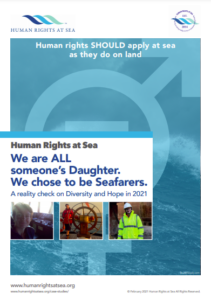Human Rights at Sea published a case study by Advisory Board member and maritime professional, Joanne Rawley, on the issue of gender diversity and inclusion in shipping.
As an industry we are trying to correct the gender imbalance by highlighting the possibility of a successful career at sea for women, which I truly believe can be realised, and actively encouraging their recruitment. However, research is also underway to explore the reasoning that many women leave as well as continuing to fight for implementation of maternity leave policy and improved sanitary health,
…Joanne highlights.
On the IMO #IAMBOARD virtual wall, ‘hopes for the future – one change’ from male and female seafarers include the following statements:
-‘Wanting safely fitting PPE’. CHIRP Maritime in 20194 conducted a small survey of 40 female seafarers of a range of ranks. “The respondents ranged from ABs and deckhands to captains, engineers, a CEO of a ferry company (former captain) and a UK MCA marine surveyor (former captain). Without exception, they have all experienced issues regarding availability or sourcing of correctly sized PPE. The majority feel they have been potentially put at risk, not so much from standard PPE but certainly by unsuitably sized fire-fighting suits, boots and gloves. A majority take some elements of self-provided PPE with them when joining a vessel. Attitudes to this necessity range from pragmatic to resentment. Purchasing and Crewing departments of companies could easily have female equivalents available.”
-‘When a complaint is made the vessel and company should take it seriously in order to deter repeat occurrences’;
The Merchant Navy chain of command and code of conduct are well entrenched within the industry and are:
- 5 – d) Behaviour towards others. A person’s anti-social behaviour can be a nuisance to others on board. In extreme circumstances, it can also place the ship and the crew at risk of danger. Such behaviour includes but is not limited to excessive noise, abusive language, harassment, bullying, aggressive attitudes and offensive personal habits.
- Section 7 clearly categorises the below as factors of gross misconduct.
- xv) conduct of a sexual nature, or other conduct based on sex affecting the dignity of women and men which is unwanted, unreasonable or offensive to the recipient;
- xvi) behaviour which seriously detracts from the social well-being of any other person on board, including but not limited to bullying, harassment, intimidation and coercion.
-If there is an issue, report it to your head of department, the Chief Officer or the Master. But if the discrimination is coming from those in leadership positions, or they are not deterring the instances they witness from the crew, then the isolation is compounded, and you can feel trapped. Fear was the main reason the bullying was not reported in numerous instances – fear of not being believed, fear of accusation of overreacting or lying which could mean reluctance to rehire or loss of sea-time opportunity as a cadet.
-‘Equal rights/respect everyone on board/no discrimination/promotion based on ability not gender’ were the most prolific comments. Adhering to common decency and one of the HRAS fundamental concepts this could be achieved. Another fine balance to be struck – on one hand encouraging more women into the industry will reduce the ‘novelty’ factor and hopefully the wariness and assumptions made. However, until significant changes are made and attitudes shifted, I’m reluctant to champion this industry as an equal opportunities arena.
-‘Empower women’ can mean many different things from separate schemes, implementing specific policy or building confidence and creating a safe workplace. Multiple HR sources acknowledge women rarely apply for a position unless they are 100% qualified for it, whereas men will apply for a position or promotion when they only meet 40–60% of the requirements – this can be attributed (according to various sources) to multiple reasons such as lack of connections; lack of testosterone and aggression; lack of confidence; the belief that a requirement is genuinely a requirement; imposter syndrome.
Find the case study herebelow:































































